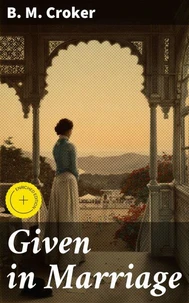"To let". Exploring love, loss, and cultural clashes in colonial India
Par :Formats :
Disponible dans votre compte client Decitre ou Furet du Nord dès validation de votre commande. Le format ePub est :
- Compatible avec une lecture sur My Vivlio (smartphone, tablette, ordinateur)
- Compatible avec une lecture sur liseuses Vivlio
- Pour les liseuses autres que Vivlio, vous devez utiliser le logiciel Adobe Digital Edition. Non compatible avec la lecture sur les liseuses Kindle, Remarkable et Sony
 , qui est-ce ?
, qui est-ce ?Notre partenaire de plateforme de lecture numérique où vous retrouverez l'ensemble de vos ebooks gratuitement
Pour en savoir plus sur nos ebooks, consultez notre aide en ligne ici
- Nombre de pages102
- FormatePub
- ISBN406-633--953560-2
- EAN4066339535602
- Date de parution10/07/2023
- Protection num.Digital Watermarking
- Taille363 Ko
- Infos supplémentairesepub
- ÉditeurGOOD PRESS
Résumé
B. M. Croker's "To Let" delves into the complexities of social dynamics in late 19th-century British society, focusing on issues of class, gender, and the pursuit of happiness within the context of marriage. Croker'Äôs prose is characterized by its sharp wit and keen observation, blending elements of realism and social commentary. Set against the backdrop of a rapidly changing London, the narrative invites readers to scrutinize the intricacies of personal desire and societal expectations, all while employing engaging dialogue and rich character development that highlights the struggles of individuals navigating their circumstances.
B. M. Croker, a luminary of her time, was shaped by her own experiences as a woman in a predominantly male literary landscape. Raised in a culturally rich environment, she was influenced by the social constraints of her era, which propelled her to write works that challenged the status quo. Her insights into the lives of women, coupled with her keen sense of satire, resonate throughout "To Let, " revealing a depth of understanding of both male and female perspectives in a constraining society.
Recommended for readers interested in historical fiction and social critique, "To Let" offers a fascinating glimpse into the interplay of love, ambition, and societal mores. Croker's ability to intertwine humor with poignant observations makes this novel not only enjoyable but also intellectually stimulating, urging readers to reflect on the evolution of societal norms and personal freedom.
B. M. Croker, a luminary of her time, was shaped by her own experiences as a woman in a predominantly male literary landscape. Raised in a culturally rich environment, she was influenced by the social constraints of her era, which propelled her to write works that challenged the status quo. Her insights into the lives of women, coupled with her keen sense of satire, resonate throughout "To Let, " revealing a depth of understanding of both male and female perspectives in a constraining society.
Recommended for readers interested in historical fiction and social critique, "To Let" offers a fascinating glimpse into the interplay of love, ambition, and societal mores. Croker's ability to intertwine humor with poignant observations makes this novel not only enjoyable but also intellectually stimulating, urging readers to reflect on the evolution of societal norms and personal freedom.
B. M. Croker's "To Let" delves into the complexities of social dynamics in late 19th-century British society, focusing on issues of class, gender, and the pursuit of happiness within the context of marriage. Croker'Äôs prose is characterized by its sharp wit and keen observation, blending elements of realism and social commentary. Set against the backdrop of a rapidly changing London, the narrative invites readers to scrutinize the intricacies of personal desire and societal expectations, all while employing engaging dialogue and rich character development that highlights the struggles of individuals navigating their circumstances.
B. M. Croker, a luminary of her time, was shaped by her own experiences as a woman in a predominantly male literary landscape. Raised in a culturally rich environment, she was influenced by the social constraints of her era, which propelled her to write works that challenged the status quo. Her insights into the lives of women, coupled with her keen sense of satire, resonate throughout "To Let, " revealing a depth of understanding of both male and female perspectives in a constraining society.
Recommended for readers interested in historical fiction and social critique, "To Let" offers a fascinating glimpse into the interplay of love, ambition, and societal mores. Croker's ability to intertwine humor with poignant observations makes this novel not only enjoyable but also intellectually stimulating, urging readers to reflect on the evolution of societal norms and personal freedom.
B. M. Croker, a luminary of her time, was shaped by her own experiences as a woman in a predominantly male literary landscape. Raised in a culturally rich environment, she was influenced by the social constraints of her era, which propelled her to write works that challenged the status quo. Her insights into the lives of women, coupled with her keen sense of satire, resonate throughout "To Let, " revealing a depth of understanding of both male and female perspectives in a constraining society.
Recommended for readers interested in historical fiction and social critique, "To Let" offers a fascinating glimpse into the interplay of love, ambition, and societal mores. Croker's ability to intertwine humor with poignant observations makes this novel not only enjoyable but also intellectually stimulating, urging readers to reflect on the evolution of societal norms and personal freedom.





